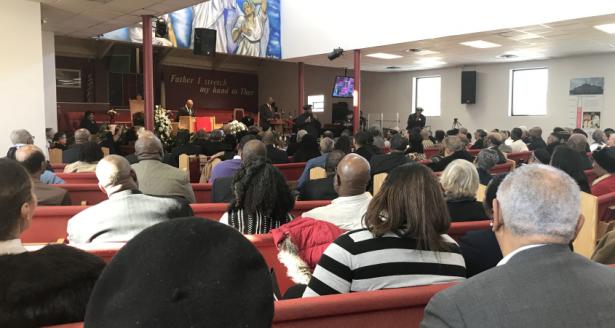Several hundred people filled the sanctuary of Proviso Baptist Church, 1116 S. 5th Ave., in Maywood, on Feb. 16, to pay their respects to William Edward Hampton — the brother of the slain Black Panther leader Fred Hampton and a Maywood Park District commissioner.
Hampton, most widely known as Bill, died on Feb. 8 after undergoing an unspecified surgical procedure. He was 72 years old.
Many of those who spoke during the service remembered Hampton’s revered historical memory and his efforts to perpetuate his brother’s memory.
“I knew Bill for almost 50 years and his work was to keep Fred’s memory and that history alive,” said Flint Taylor, the Hampton family’s longtime attorney. “He brought that history into the present. He taught that history. He was a brilliant historian.”
As a testament to Bill’s success, Taylor said that he had been in court during the Friday service and needed to ask the judge for a recess. The case was related to former Chicago police commander Jon Burge’s notorious torture operation that took place in the 1970s and 1980s.
“[When I told him I needed a recess to come to Bill’s funeral], the judge sent his respects,” Taylor said.
There were those among the speakers who were actors in the historical drama that played out in the wake of Fred Hampton’s 1969 assassination at the hands of Chicago police, the Cook County State’s Attorney’s office and the FBI.
Fred Hampton, Jr., 48, was in his mother’s womb as she slept next to Fred in their West Side apartment and was nearly killed herself as officers riddled the civil rights leader’s body during an early morning raid.
The son of the Illinois Black Panther Party chairman, who is himself the chairman of the Black Panther Party Cubs, said that the government seemed to have predicted the kind of leader his father would become.
“The FBI placed a tap on my grandma’s phone when Fred was 14 years old,” he said.
Congressman Danny K. Davis (7th) said that, while he never knew Fred personally, the beginnings of a decades-long bond with Bill, their sister, Frances, and their mother, Iberia, formed the night after the Black Panther leader’s death.
Davis said that as he sat with the Hamptons inside of a noted Chicago funeral home known for burying slain revolutionaries, the fear drummed up after Fred’s death had not abated.
“We were scared, we weren’t sure if the police were going to come in,” he said. “Right there on Roosevelt Road.”
Rev. Albert Sampson — the influential clergyman, activist and organizer who worked closely with Dr. Martin Luther King, Jr. and was an assistant to Rev. Ralph Abernathy — recalled the genesis of the Fred Hampton Scholarship Fund, which Bill had organized and administered since 1971.
“In my discussions with the Hampton family, I found out that Fred wanted to be a lawyer,” Sampson said, adding that those conversations prompted Abernathy to commit $1,000 to a nascent foundation for young people with the same ambitions. Under Bill’s guidance, roughly 200 scholarships had been given out since then.
Quincy Johnson, a close friend of Bill’s, lauded the Hampton family’s efforts, led by Bill, to burnish Fred’s memory — from keeping up the scholarship fund to mounting a campaign to pressure Maywood officials to name a Maywood swimming pool (and the street where it’s located) after Fred. Those efforts, Johnson recalled, were not frictionless.
“The U.S. government put all of their resources into destroying that history,” Johnson said.
Sampson recalled local efforts to raze any memory of Fred’s assassination or the political threat that Fred and the Panthers, and even King, presented that undergirded it. Sampson said that the city tore down the Chicago apartment building where King stayed while living on the West Side during his struggle for open housing.
And “they tore down Fred Hampton’s house so there would be no vestige of history there,” Sampson said.
Davis, illustrating what the process of forgetting looks like on the national level, said that the Panthers were an inspiration for the country’s School Breakfast Program and they fought for sickle cell screening.
“[The Panthers were influences on] the nutrition program that [President Donald] Trump is talking about cutting,” Davis said, referencing Trump’s proposal to cut a significant portion of the funding for the food stamp program and introduce boxed food.
Martha Allen, one of Bill’s relatives, said that she would sometimes travel down streets with Bill as he exhibited a tour guide’s recollection of historical events and people that once happened in those spaces.
“We’ve got to teach our young people their history,” Allen said.
Others who spoke praised Bill for his quiet perseverance even as he dealt with health struggles that he often kept to himself.
Bishop Claude Porter, who delivered the eulogy, said that he’d seen Bill not long before his death. The park district commissioner was handing out food, Porter said.
Last year, Bill helped cut the ribbon on the park district’s renovated grounds on the corner of 9th Ave. and Madison St.
Rory Kennedy — the daughter of Robert F. Kennedy and the sister of Illinois Democratic gubernatorial candidate Chris Kennedy — was Bill’s guest of honor.
“Bill gave us a history and catapulted us forward,” said Arnettra Burnside, a park district commissioner. “He had a very strong will.”
Sy Bounds, a friend of Bill’s, said that he would like to see Bill’s legacy perpetuated — just as he perpetuated Fred’s. Bounds said that he would like to see the park district renamed after the Hampton family, perhaps the apartment where the family lived made into a learning museum, among other ideas.
“Let’s make this history thing happen,” Bounds said.


Spread the word